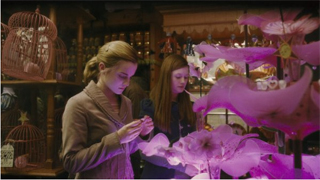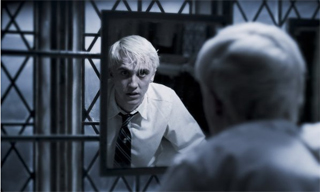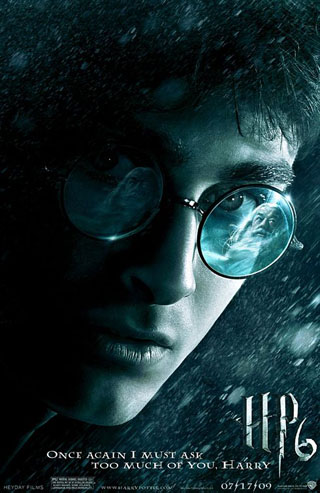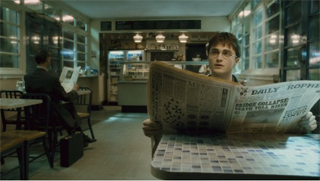Harry
Potter And
The Half-Blood Prince
For both Daniel
Radcliffe and Harry Potter, fame - or infamy - must be a
constant nuisance and a blessing. Perhaps the cleverest
touch in David Yates' take on Harry Potter and the Half-Blood
Prince is that he begins by paralleling the two. Though
for the most part the movie sticks to the weaker installments'
tendency to just lay out scenes from the book, it's kept
afloat by Yates and screenwriter Steven Kloves' touches
that remind us that underneath the fantastic, you can find
some real world concerns.
Unlike
the previous films, Yates begins at the same point - or
a few minutes later - that Harry
Potter and the Order of the Phoenix left off. A
bruised but determined Harry (Radcliffe) faces down reporters,
eager to anoint him "the Chosen One" for the headlines.
In Harry's
eyes, however, is just the grief of losing his godfather,
and when he reads about himself a few weeks later, the loss
still stings. When a Muggle waitress (Elarica Gallagher)
puts some moves on him, he tells her that Harry Potter is
a bit of a tosser.
Yes, Yates has
to deal with the fact that his adorable teen protagonists
also come with adorable teen hormones, and it's a bit jarring
to see Radcliffe flirting almost confidently. (His episode
of Extras doesn't help with the image.)
Even Dumbledore
(Michael Gambon) seems a bit disconcerted, and it's hard
to tell if he's bemused or eager to cut Harry off from such
recreational activities. The real world, our world, is in
danger, as the Death Eaters have become rather careless
about hiding their activities from the Muggles.
For a few brief
moments, it seems like the filmmakers have finally made
a Harry Potter for those who aren't part of the cult, but
the nature of J.K. Rowling's original plot forces them to
go a lot subtler in such desires. Instead, when Yates returns
to the sheer terrorist tactics of the Death Eaters, it's
in a scene created for the film, a tense attack from Bellatrix
Lestrange (Helena Bonham Carter) and the lupine Fenrir Greyback
(Dave Legeno) on the Weasley household. It underscores the
helplessness against evil when people turn a blind eye,
and one of Rowling's pet themes, that there is a certain
strength in friendship.
When
the movie lets itself be a movie like that, it flows beautifully.
Only Alfonso Cuaron (in The
Prisoner of Azkaban) before Yates played with cinematic
language like this. Cinematographer Bruno Delbonnel controls
his hues tightly, often playing in chiarascuro, giving everything
a slightly ethereal glow that can be both warming and deadly
cold. And make no mistake, those who have not read the book;
this story can be deathly cold.
They've sacrificed
some of the complexity in the idea of the Half-Blood Prince,
a long ago Hogwarts' student whose potions book Harry has
picked up. Even in the book, that mystery is somewhat of
a red herring, having little bearing on the main plot except
to give Harry a different viewpoint about the past.
Most of that
has been junked in favor of trying to move the narrative
along. Instead, the movie focuses on Harry finally being
able to directly serve Dumbledore as a spy, currying favor
with a shallow Potions Professor, Horace Slughorn (a terrifically
unctuous Jim Broadbent). Long ago, Slughorn may have provided
a key to the rise of the evil Voldemort - a character only
talked about in this movie, not seen. Harry has to find
out what Slughorn really knows, and really remembers, while
also still dodging the consequences of his own renown and
hormones.
 |
Love has found
the trio (well, plus Ginny Weasly as played by Bonnie Wright),
and Yates handles those scenes as lightly as he handles
the suspense ominously. Once again, the original casting
remains brilliant, as Rupert Grint has lost none of his
ability to snap back and forth between comic relief and
stalwart friendship. You can't help but feel that Emma Watson's
Hermione Granger is too good for him, but then who doesn't
know a couple like that?
The pangs of
love aren't the worst that these kids are set to face in
this movie, and for the most part it balances the two well.
A little bit of it gets bogged down in going back over concerns,
a weakness in the book's plotting, too. And, like its characters,
it's trying to be more thoughtful rather than a never-ending
panoply of wonders.
Dark deeds are
afoot in this movie, as the story hurtles toward its finale.
Despite curiously sliding back into a PG rating after the
PG-13 of the previous movie, this isn't one for younger
children. Though it's relatively innocent (and funny) in
its treatment of teen sexuality, the complexity of emotions
as they prepare themselves to vie with a mass murderer will
be very hard for little ones to understand or be entertained
by. The internal struggle of Draco Malfoy, for instance,
gets very well portrayed by Tom Felton, but a little too
internal for those who prefer things in black and white.
 |
Of course, there
are also actual obvious monsters here, but at least the
production team has stayed consistent with the look of the
supernatural. CG techniques have improved since the first
Harry Potter all those years ago, but though everything
moves more smoothly here, all CG creatures still have the
same unreal texture from the first two movies. However,
Yates does manage to stage Hagrid (Robbie Coltrane) in a
much more believably "giant" fashion than any previous movie.
It's
still bound by a bit of formula in its structure, but here,
that serves a purpose that will tie directly into the next
movie. By keeping the team of Yates and Kloves through the
end, the producers continue with an advantage they only
got with The Order of the Phoenix - they can finally
think ahead to the service of plot and theme, and not just
the bags o'money the franchise earns.
|









